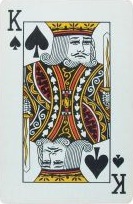 Some of the best and the worst of the legal profession can be seen through Socha v. Boughton, No. 12-1598, decided by the Seventh Circuit this past week. The substance of the case involved the court’s applying — for the first time — the doctrine of equitable tolling to excuse a late filing by a state prisoner in a habeas case. This required a conclusion that the district court had abused its discretion in concluding otherwise, including the catchy characterization that “[t]he mistake made by the district court and the state was to conceive of the equitable tolling inquiry as the search for a single trump card, rather than an evaluation of the entire hand that the petitioner was dealt” (slip op. at 19).
Some of the best and the worst of the legal profession can be seen through Socha v. Boughton, No. 12-1598, decided by the Seventh Circuit this past week. The substance of the case involved the court’s applying — for the first time — the doctrine of equitable tolling to excuse a late filing by a state prisoner in a habeas case. This required a conclusion that the district court had abused its discretion in concluding otherwise, including the catchy characterization that “[t]he mistake made by the district court and the state was to conceive of the equitable tolling inquiry as the search for a single trump card, rather than an evaluation of the entire hand that the petitioner was dealt” (slip op. at 19).
Yet it is the lawyering that I want especially to note.
The worst is explicit. The court describes how “Socha’s efforts to file a [timely habeas petition] were hampered at every turn, through no fault of his own” (slip op. at 4). This includes “his inability for more than a year despite persistent requests to obtain his case file from the [lawyer] who had represented him at trial” (slip op. at 5). Perhaps it also includes a procedural assertion by the state before the Seventh Circuit that the court (through Chief Judge Diane Wood) termed “frivolous” (slip op. at 11). Should not the state avoid frivolous arguments?
Fortunately, while their work is more implicit in a judicial opinion, the best do not lack all conviction. That is, the Seventh Circuit is not likely to have concluded that a district court abused its discretion on a matter of equity without there having been some very good lawyering on behalf of the appellant. Socha received such representation in this appeal from Rachel M. Blise, a recent Marquette Law School graduate (Class of 2010). Kudos to Rachel and her colleagues at Foley & Lardner for their work, on a pro bono basis, in ensuring that this habeas petition will be decided on the merits.
